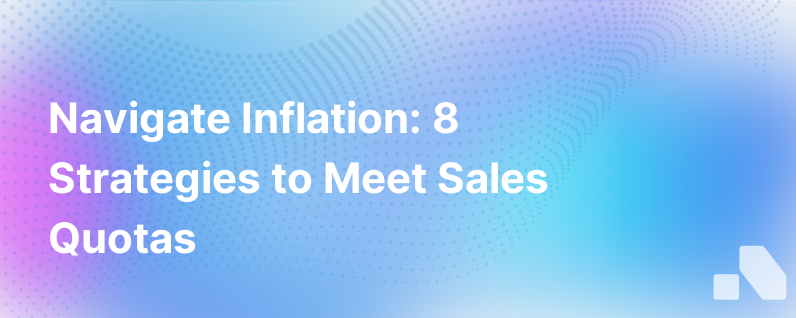
Inflation is the specter that haunts economies and businesses worldwide, posing significant challenges that directly affect the commercial landscape. Rising prices can create ripple effects that influence purchasing power, buyer behavior, and ultimately the sales sector. In such periods of inflation, hitting sales quotas can be a daunting task.
However, it’s not impossible, and proactive, strategic measures can help your sales team consistently meet their targets. In this piece, we will explore eight concrete ways to do so. While strategies depend on multiple factors such as the product, target market, and stage of your business, these tactics offer a good starting point.
1. Understand Your Market:
Communication with your current and potential customers becomes crucial amidst economic turmoil. Understanding how inflation impacts them helps you better empathize with their financial concerns. Customer surveys, direct interactions, and social listening are all ways to gather this essential feedback.
2. Prioritize Value Over Price:
Profit margins may be squeezed due to inflation, but this should not be the only focus. It might be tempting to compete on price, but differentiating on value can be more effective. Gauge what makes your product or service special and communicate this effectively to your prospects.
3. Improve Your Sales Process Efficiency:
Leveraging the benefits of customer relationship management (CRM) software can help you improve the efficiency of your sales process. From lead generation to deal closure, having a streamlined process in place saves both time and money. Tools such as Aomni can achieve this without you having to exert any effort.
4. Optimize Your Pricing Strategy:
Revisit and reconsider your pricing strategy. Promotional pricing, bundle pricing, or seasonal pricing might be strategies to look into. Remember, your pricing strategy should not only take into consideration your own financial burdens but also those your customers may be experiencing.
5. Explore New Markets:
Inflation impacts different regions unevenly. By expanding into new markets—particularly those less affected by the surge of costs—you can potentially increase your sales and reduce dependence on one market.
6. Enhance Your Sales Skills:
During inflationary periods, it becomes increasingly important for salespeople to brush up on their persuasion skills. Motivational interviewing, active listening, and understanding buyer behavior can lead to better customer relationships and higher sales.
7. Stay Flexible:
Being adaptive and flexible in your strategies is key when navigating economic pressures. Regularly reviewing sales goals, rewards systems, and processes will help you keep up with changing market conditions, and ensure your strategy is always attuned to the current economic climate.
8. Focus on Exceptional Customer Experience:
Achieving customer loyalty during inflation is challenging but not impossible. Providing an exceptional experience at every touchpoint in the customer journey can encourage customers to stick with your product or service. Remember, it’s not just the product; it's the overall experience that counts.
Conclusion:
Experiencing inflation can be stressful for both businesses and consumers. However, by employing strategic measures and staying compassionate toward customer concerns, your sales team can overcome these challenges. The key is to continue delivering exceptional value and service and to adapt your strategies to evolving market conditions.
Utilizing an AI platform like Aomni can ensure real-time account research, world-class competitive insights, and personalized sales content. This removes much of the burdensome effort—freeing up your time to focus on what matters most: building lasting connections with your customers. No matter the economic climate, those connections are what fuel sustainable business growth.